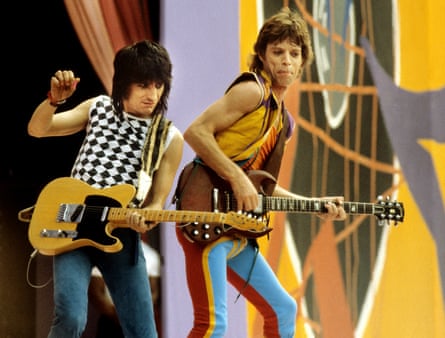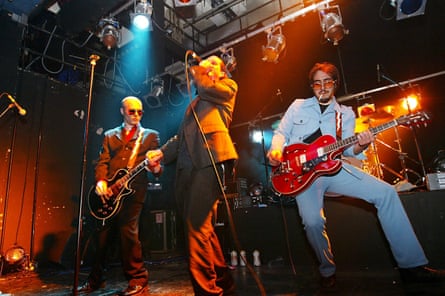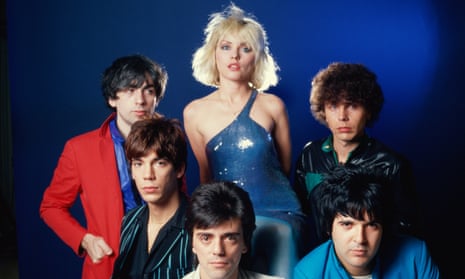1. George Harrison: Art of Dying
In 1970, disco was not yet a twinkle in Kenny Gamble and Leon Huff’s eyes, but disco-rock (a genre I’ll describeas belonging to both genres, taking rhythm from the former, instrumentation and sound from the latter) was already on its way. On one of the least disco-y albums ever – Beatle George Harrison’s earnest, doleful debut solo triple LP, All Things Must Pass - and with a song about one of the least disco-y subjects imaginable – coming to terms with mortality – Harrison managed to conjure the unborn spirits of both. It helped that his backing band was near as dammit Derek and the Dominoes, who in their love of R&B and gospel drew on sources that would also nourish disco. It’s a downright weird thing to have happened.
2. Led Zeppelin: Trampled Underfoot
Led Zep were so rock-and-roll it was all but unthinkable that disco could sneak in, but it did. In this cut from Physical Graffiti (1975), they sound as if they were glomming on to the hard-edged contemporary funk of Ohio Players et al. But with drummer John Bonham stomping out a vicious two-step rather than hitting the one, while Jimmy Page slashed at everything in sight with flick-knife guitar, they strutted into disco’s nascent territory. If Harrison’s song had been a premonition of disco to come, Zeppelin’s arrived just as disco hit the mainstream.

3. Rolling Stones: Miss You (Special Disco Version)
Here it is: the moment in 1978 when rock embraced knowingly and without reservation the cultural ascendancy of disco. It was one thing for the Bee Gees, not so long since a mildly psychedelic pop-rock group, to adapt themselves brilliantly to disco and thus revive their flagging career; or for cartoon rockers Kiss to join the dots between the glam rock stomp and the disco beat on the glorious I Was Made for Lovin’ You (1979). It was quite another for disco to be seized upon by “the greatest rock’n’roll band in the world”. Whether or not Miss You was conceived as a disco tune (Mick Jagger and Keith Richards differ on that), it was painstakingly crafted as one. It wasn’t just Charlie Watts turning that wonderfully loose yet precise method of his upon the four-to-the-floor, nor Bill Wyman hanging around in clubs until he perfected the pneumatic bassline that drives the song. It was the way they saluted the format itself, stretching it over eight minutes on to their first 12-inch single. It’s the lodestar of the band’s last truly great – although undervalued – period, melding their own lustful whiplash menace with their adopted genre’s glistening, nocturnal allure. No music has ever been more utterly of the night than disco, and that suited the Stones perfectly.
4. Blondie: Heart of Glass (album version)
There were some bands for whom disco-rock wasn’t just a dalliance; it was the purest expression and zenith of their craft. Abba were the greatest of them, but Blondie in their prime weren’t far off: the gleaming, chrome-plated thrill machine that is Atomic; the dreamlike shuffle of Rapture. Before those came the new wave/bubblegum blockbuster album Parallel Lines, and there on side two was Heart of Glass, one of the first disco-rock tunes to recognise and reflect how disco lent itself not just to Good Times but to a kind of shimmering melancholia. Even the title is just right, capturing both the emotional fragility and the crystalline surface of the song, which is deliciously simple: a metronomic Clem Burke pulsebeat; the instruments gliding in its wake; the nagging little organ riff, like a secret sorrow poking at you as you head to the dancefloor; Debbie Harry’s rueful vocal - “We could’ve made it cruising, yeah...” As a medium for sadness under bright lights, Disco was rivalled in its time only by the kind of soft rock Roxy Music steered so close. Blondie went all the way over, and did it perfectly.
5. Abba: Voulez-Vous
The masters, the Olympians, the ne plus ultra of disco-rock. It took some time for Abba to be recognised as what they are: a group who belong in the very first rank of the greats. And disco-rock was their métier, a form in which they excelled like no other, and in which no others excelled as they did. It had begun with Dancing Queen three years before. On the Voulez-Vous LP, it reached its pinnacle. It isn’t a disco rock album exclusively but it contains As Good As New (which with its handclaps and chamber strings finds a contemporary disco-rock sibling in ELO’s equally joyous Shine a Little Love from the same year); the hilarious and adorable Does Your Mother Know, partly purloined by fellow disco-rock titans Pulp for Disco 2000; and best of all, the title track. No pure disco tune ever gave so barbed an account of empty hedonism. “And here we go again, we know the start, we know the end.” It’s a song about pleasure, about addiction, about compulsion. It is desolate, endlessly exciting, and quite, quite brilliant.
6. Yoko Ono: Walking on Thin Ice
By the turn of the decade, art-rock had cottoned on to the possibilities of disco; Ze records, for example, early home of inter alia Was (Not Was), Suicide and Kid Creole and the Coconuts, characterised its output as “mutant disco”. Yet nobody welded disco’s dynamism and art-rock’s spiky intransigence more ingeniously than a 47-year-old conceptual artist dismissed with monumental unfairness as a celebrity wife. This was the last thing Yoko Ono’s husband John Lennon worked on; he was carrying the tape when he was shot. It’s his guitar that flickers and squalls through its eerie, pattering soundscape. One of the most frequently reworked and remixed tracks, its definitive version runs close to the original hit single – a slightly sharpened and elongated version that first appeared as a B-side on the 1985 12-inch of Ono’s Cape Clear, and was later chosen as an apt introduction to the experimental Disco Not Disco compilation in 2000. If you think Steve Miller Band’s 1982 chart-topper Abracadabra owes more than a little to its sauntering bassline, you’re not alone.
7. Duran Duran: Hungry Like the Wolf
Most pop-culture movements reach a natural end, but disco is perhaps unique in having had a direct hit put out on it. While some may still deny it, the subtext to the “Disco Sucks!” campaign was an effort to reassert the supremacy of supposedly straight, white rock music. The campaign, sadly, succeeded in its short-term goal – dislodging disco from its pre-eminence – but in the long term it proved a failure. Duran Duran were disco-fied to the nines. Rio is the greatest disco-rock album ever made. What other giants of the sub-genre ever committed to a complete album of the stuff? It had the snarl, the razor-toothed bite, of good rock music, and the glossy, synthetic delirium at which latter-day disco excelled. If you have to pick a single track to represent it, which I do, then Hungry Like the Wolf – simultaneously absurd, exhilarating, carnal, exotic and relentless – is bound to be the one.
8. Pulp: Countdown (single version)
By the early 90s disco was already a retro form. It would over time find no shortage of new exponents, particularly among American bands fascinated by 80s British music, whether significant (The Killers), superb (LCD Soundsystem), or silly (The Bravery, whose An Honest Mistake is nonetheless a belter). Like Abba before them, Pulp weren’t a disco-rock band full-time. But when they were one, they were never better. Lumped in with Britpop’s laddish, dumbed-down cod-proletarianism, Pulp were something quite different – whip-smart, emotionally, musically and culturally literate outsiders, canny enough to push hard on an opening door, and truculent enough not to compromise once they’d got into the room. Their love of disco may not have been intended to represent all this; but it did – and Countdown shows how ahead of the game they were. In what was soon to be a familiar Pulp pattern, this bedroom disco-rock classic builds gradually from introverted longing to a climax. Its rhythm represents the teenage narrator’s heartbeat, his sense of the seconds ticking down, the urgency with which he seeks to taste life and sex. No other band could have captured it like this; no other music could have provided the means.

9. Electric Six: Danger! High Voltage
If Electric Six had retired on the spot after releasing their debut single, it would have been a pity, and deprived the world of a great deal of fun. But they would still have accomplished exactly what they were put on the planet to do. And that was to create music so insanely urgent that hearing it felt like being the target of a sustained lightning strike. 2002’s Danger! High Voltage is, well, electrifying. It’s about lust, naturally, with which both disco and rock have always been intimately concerned; and there is no way it could channel its fearsome charge into your veins without invoking both - the beat acting as a pump, the guitar as the needle. It’s the apotheosis of the very idea of disco-rock.
10. The Gossip: Standing in the Way of Control (album version)
The sheer otherness of disco was always a big part of its appeal, but one emotion it was seldom required to summon was the anger of that otherness. The Gossip changed that, pitting it against their serrated rock style to create a magnificent four minutes of highly focused fury. At a time when George W Bush was championing the Federal Marriage Amendment to the US constitution, which would have outlawed all forms of marriage other than one man to one woman, Beth Ditto and her band responded with one of the outstanding protest songs of this century, one which makes its point through friction and feeling as much as through its (relatively oblique) lyrics. It was written not to change the minds of equal marriage’s enemies, but to rally and encourage those who needed and supported it. On those terms, it was a success; as a straight-up disco-rock banger, it is an outright triumph.

Comments (…)
Sign in or create your Guardian account to join the discussion